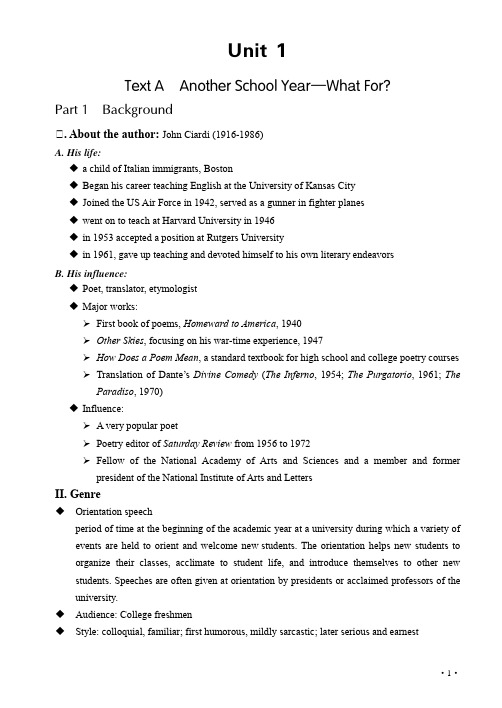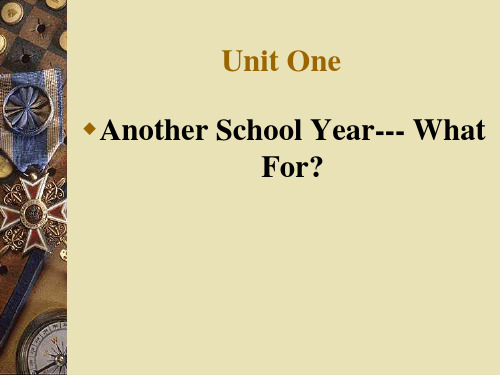现代大学英语第二册 第一课Another School Year---What For 单元测试 quiz 1
(完整word版)课文原文 Unit 1 Another School Year-What For

如果对您有帮助,请您也上传资源,帮助更多的人Unit 1 Another School Year ----——What For?John Ciardi1.Let me tell you one of the earliest disasters in my career as a teacher。
It wasJanuary of 1940 and I was fresh out of graduate school starting my first semester at the University of Kansas City. Part of the student body was a beanpole with hair on top who came into my class, sat down, folded his arms, and looked at me as if to say “all right, teach me something." Two weeks later we started Hamlet. Three weeks later he came into my office with his hands on his hips。
“Look,” he said, “I came here to be a pharmacist。
Why do I have to read this stuff?”and not havinga book of his own to point to, he pointed to mine which was lying on the desk。
2.New as I was to the faculty, I could have told this specimen a number of things.I could have pointed out that he had enrolled, not in a drugstore-mechanics school,but in a college and that at the end of his course meant to reach for a scroll that read Bachelor of Science. It would not read: Qualified Pill—Grinding Technician.It would certify that he had specialized in pharmacy, but it would further certify that he had been exposed to some of the ideas mankind has generated within its history.That is to say, he had not entered a technical training school but a university and in universities students enroll for both training and education。
现代大学英语(第二版) 精读2 第1单元知识点

Unit 1Text A Another School Year—What For?Part 1 BackgroundⅠ. About the author: John Ciardi (1916-1986)A. His life:◆a child of Italian immigrants, Boston◆Began his career teaching English at the University of Kansas City◆Joined the US Air Force in 1942, served as a gunner in fighter planes◆went on to teach at Harvard University in 1946◆in 1953 accepted a position at Rutgers University◆in 1961, gave up teaching and devoted himself to his own literary endeavorsB. His influence:◆Poet, translator, etymologist◆Major works:➢First book of poems, Homeward to America, 1940➢Other Skies, focusing on his war-time experience, 1947➢How Does a Poem Mean, a standard textbook for high school and college poetry courses ➢Translation of Dante’s Divine Comedy (The Inferno, 1954; The Purgatorio, 1961; The Paradiso, 1970)◆Influence:➢ A very popular poet➢Poetry editor of Saturday Review from 1956 to 1972➢Fellow of the National Academy of Arts and Sciences and a member and former president of the National Institute of Arts and LettersII. Genre◆Orientation speechperiod of time at the beginning of the academic year at a university during which a variety of events are held to orient and welcome new students. The orientation helps new students to organize their classes, acclimate to student life, and introduce themselves to other new students. Speeches are often given at orientation by presidents or acclaimed professors of the university.◆Audience: College freshmen◆Style: colloquial, familiar; first humorous, mildly sarcastic; later serious and earnestPart 2 Word Study1.accomplishment n.①achievement 成就;成绩Books are man’s peculiar accomplishment. (para.12) 书本是人类特有的成就。
Unit1现代大学英语精读2精品PPT课件

Background Information
Do you know anything about the famous historic literary figures below? Match the related information.
Name
William Shakespeare Alighier Dante
Unit One
Another School Year--- What For?
Topic discussion:
Why did you come to universities? What do you expect to learn in universities? Do you now have new visions of the purpose
8. It was well worthy to strive arduously in __p_u_r_s_u_i_t of our own happiness and dream!
9. We can __ce_r_t_if_y__for his competence as an editor .
--- by La Rochefoucauld
Pronunciation Meaning(s) & usage Collocations derivatives synonyms & antonyms Similar words Cultural information
Check-on Preview
in American high schools and universities se_n_s_i_ti_v_e Able to understand or appreciate art, music or
Another school year-what for

Main Idea
The professor had a student whose
purpose was only to beapharmacist,when he was fresh out of graduate school.Then he made a
distinction between training and
Part 2(para.9-14): the writer tells us the purpose of a university is “putting its student in touch with best civilization, the human race has created.”
Grammar and sentences
1...in universities students enroll for both training and education.
① Both...and... a) ......和......
e.g. I’d like to drink both coffee and tea.
The cost should average out at about 6 pounds per one.
5.employ v. ① eg. Then for about 8 hours of each day you will, I hope,
be useful employed. (to spend time doing sth. ) ② Jerry was employed as a math teacher in my school. ③ The police had to employ force to enter the building.
LessononeAnotherschoolyearwhatfor

Another School Year --- What For?
Contents
Part One: Warm-up Part Two: Background Information Part Three: Word Study Part Four: Text Appreciation Part Five: Assignments
sections:
Purgatory, with hell on
hs right and
•
the “Inferno” (Hell), in which the great classical poet Virgil leads Dante on a trip
heaven on his lef源自.through hell;
Bach is also known for the numerical symbolism and mathematical exactitude which many people have found in his music—for this, he is often regarded as one of the pinnacle geniuses of western civilization.
I. Author
Author ’s quotes
➢ “The day will happen whether or not you get up.”
➢ “You do not have to suffer to be a poet. Adolescence is enough suffering for anyone.”
➢ “A university is what a college becomes when the faculty loses interest in students.”
完整word版课文原文 Unit 1 Another School Year-What For

完整word版课文原文 Unit 1 AnotherSchool Year-What For2篇Unit 1: Another School Year – What For?Part 1:又一个学年开始了。
对于许多学生来说,新学年意味着新的开始,新的机会,以及学习新知识的机会。
但是,很多学生对于为什么要上学感到困惑。
他们想知道这一切到底是为了什么。
首先,我们必须意识到上学不仅仅是为了获取知识。
当然,学习知识是上学的一个重要目标,但上学还有其他很多重要的目的。
一个重要的原因是为了培养学生的社交能力。
在学校里,学生们有机会与同龄人交流和互动,结交新朋友。
通过与他人合作,分享观点和想法,他们能够培养出团队合作的能力。
此外,学校还提供了各种机会,如参加社团活动、俱乐部和体育比赛,帮助学生建立良好的人际关系和团队合作。
其次,上学也有助于学生发展个人技能和兴趣。
学校提供了各种各样的课程和活动,帮助学生探索自己的兴趣和潜能。
无论是音乐、绘画、体育还是科学,学生们有机会发现自己的热情并培养相关的技能。
通过参与这些活动,学生能够发展出自信心和自我意识,并在感兴趣的领域中取得成功。
此外,上学还为学生提供了更多的机会去探索世界。
通过学习各种学科,学生们能够获得关于不同领域的知识和理解。
他们可以了解历史、地理、科学和文化等方面的信息。
这样的知识有助于学生更好地理解和适应不同的环境,培养他们的思维能力和批判性思维。
最后,上学也为学生提供了未来成功的基础。
通过获得优质的教育,学生们能够为未来的大学和职业生涯做好准备。
他们会学到许多有用的技能,如解决问题、沟通、组织和创新等。
这些技能将成为他们在未来生活中取得成功所必需的。
在总结中,上学不仅仅是为了学习知识。
它还为学生提供了培养社交能力、发展个人技能和兴趣、探索世界以及为未来成功打下基础的机会。
所以,当学生们问起为什么要上学时,我们可以告诉他们上学是为了让他们成为全面发展并为未来做好准备的人。
Unit1-现代大学英语精读2课件PPT
12. Average out 13. See to it that… 14. Preside over 15. Suffice it (to say) that… 16. Be out to do sth./for sth. 17. Be stuck for 18. The chances are that… 19. Have no business doing sth./ to
➢“Virtues are lost in self-interest as rivers are lost in the sea.”
➢“The surest way to be deceived is to think oneself cleverer than the others.”
➢“We always like those who admire us; we do not always like those whom we admire.”
Bach
Homer
Einstein
Chaucer
La Rochefoucauld
Nationality
Masterpiece
Italian
Relativity
German
Maxims
Swiss-American Odyssey
French
Canterbury Tales
English
Church Cantatas
Theory of Relativity
Maxims
Swiss-American Odyssey
French
Canterbury Tales
English
Church Cantatas
Greek English
lesson-1-Another-school-Year--What-ForPPT优秀课件
Text Structure
1
Part I – (Para 1— 8) the writer encountered his student, tried but failed to convince the student that a pharmacy major needs to read great writes.
scenic spot.
If sth. points to a particular situation , it suggests that the situation exists or is likely to occur.
Eg: All evidence points to his guilt.
11
The Author– John Ciardi
( 1916—1986) was an accomplished poet and essayist known for his translation of Dante’s Inferno in the US.
The essay was first published in the Rutgers Alumni Monthly, November, 1954.
14
Lesson One
New words and phrases:
1. fresh ( be fresh out of ) 2. body 3. point to/point out 4. specimen 5. enrol 6. reach for 7. scroll
15
Lesson One
2
Part II– (para 9—14) the writer restates, 14 years later, what he still believes to be the purpose of a university– putting its students in touch with the best civilizations the human race has created.
现代大学英语精读第2册课件lesson1(本资源由攀登英语网.
Memorable Quotes
1. In education we are striving not to teach youth to make a living, but to make a life. ---- William White 2. The foundation of every state is the education of the youth. ---- Diogenes 3. I have never let my schooling interfere with my education. ---- Mark Twain
Lesson One
New words and phrases:
1. fresh ( be fresh out of ) 2. body 3. point to/point out 4. specimen 5. enrol 6. reach for 7. scroll
Lesson One
8. certify 9. specialize 10. expose 11. generate 12. matter 13. average 14. hold 15. be employed in doing sth.
Lesson One Another School Year--- What For?
Introduction
Topic discussion: 1. What do you expect from a new semester? 2. Do you think you can fulfil that? If you think you can , how? If you think you can’t, why not?
Unit1现代大学英语精读2精品PPT课件
Another School Year--- What For?
Topic discussion:
Why did you come to universities? What do you expect to learn in universities? Do you now have new visions of the purpose
Work in group of 7 to translate the notes given after the text and then choose a representative to report the translation to the class.
➢“We seldom find such sensible men as those who agree with us.”
appreciation
Memorable Quotes
1. In education we are striving not to teach youth to make a living, but to make a life.
---- William White 2. The foundation of every state is the education of the youth.
---- Diogenes 3. I have never let my schooling interfere with my education.
---- Mark Twain
Preview Work
New words & Expressions
1. Accomplishment 2. Acquire 3. Assume 4. Available 5. Certify 6. Employ 7. Expose 8. Qualified 9. Be fresh out of/ from… 10. Mean to do sth. 11. Specialize in
- 1、下载文档前请自行甄别文档内容的完整性,平台不提供额外的编辑、内容补充、找答案等附加服务。
- 2、"仅部分预览"的文档,不可在线预览部分如存在完整性等问题,可反馈申请退款(可完整预览的文档不适用该条件!)。
- 3、如文档侵犯您的权益,请联系客服反馈,我们会尽快为您处理(人工客服工作时间:9:00-18:30)。
Book 2 Unit 1 Another School Year---What For? I. Spell out the words according to the definitions given. The initial letters are given as a clue. 1. a ______behaving in a proud and self-important way 2. a ______ able to be bought, used or easily found 3. a ______ to gain; to get for oneself by one’s own work 4. c ______ to state that sth is true or correct, esp. after some kind of test 5. c ______ a person who pays for help or advice from a person or organization 6. c ______ educated and refined; having an advanced culture 7. d ______ based on the idea that everyone should have equal rights and should be involved in making important decisions 8. e ______ to officially arrange to join a school or university 9. e ______ to enable sb to see or experience new things or learn about new beliefs, ideas, etc. 10. f ______ all the teachers of a university or college 11. i ______certain to happen and impossible to avoid 12. m ______ to continue to have as before 13. p ______ to lead; to be in charge 14. p ______ the act of trying to achieve sth. in a determined way 15. r ______ to care for a person or an animal until they are fully grown 16. s ______ able to understand or appreciate art, music or literature 17. s ______ to be enough 18. s ______ a certificate of an academic degree 19. s ______ to spend most of your time studying one particular subject 20. s ______ related to your spirit than to your body or mind
II. Fill in the blanks with the phrases we learned in the text. 1. It was January of 1940 and I _____graduate school starting my first semester at the University of Kansas City. 2. I could have pointed out that he had enrolled, not in a drugstore-mechanics school, but in a college and that at the end of his course he meant to ____ a scroll that would read Bachelor of Science. 3. It would certify that he had _____ pharmacy, but it would further certify that he had been exposed to some of the ideas mankind has generated within its history. 4. Nevertheless, I was young and I had high sense of duty and I tried to put it this way: “For the rest your life”, I said, “your days are going to _____ about 24 hours. 5. You will ______ the cyanide stays out of the aspirin, that the bull doesn’t jump the fence, or that your client doesn’t go to the electric chair as a result of your incompetence.
6. _________ everything else, they will probably be what puts food on your table, supports your wife, and rears your children. 7. What do you________ those other eight hours?
8. Will the children ever_______ a reasonably penetrating idea at home? 9. Will you be _____ a family that maintains some contact with the great democratic intellect? 10. “Look,” he said, “you professors raise your kids your way; I’ll take care of my own. Me, I’m _______make money. 11. If you have no time for Shakespeare, for a basic look at philosophy, for the continuity of the fine arts, for that lesson of man’s development we call history—then you ____________ in college. 12. _______ few if any of you will leave your names to be cut into those stones.
13. When you have read a book, you have_______ your human experience. 14. A civilized mind is,_______, one that contains many such lives and many such worlds. 15. We _______ make available to you, as best we can, that expertise.
III. Translation: 1. 总理明天将赴纽约出席联合国会议。(leave for…) 2. 他们缺得不是钱,而是经验。( not…but…) 3. 他们到中国来不仅仅是为学汉语,而是为了了解中国文化。 (not only…but also…) 4. 我不太清楚他为什么没来。既可能是他不感兴趣,也可能是忘了 (either…or…) 5. 社会应该既尊重科学家,也尊重环卫工人。(both…and…)
V. Writing: With the author’s idea about the college education, what do you expect to get out of college?
Key: I. 1 arrogantly 2 available 3 acquire 4 certify 5 client 6 civilized 7 democratic 8 enroll 9. expose 10 faculty 11.inevitable 12.maintain 13. preside 14. pursuit 15. rear 16. sensitive 17. suffice 18. scroll 19. specialize 20. spiritual
II. 1. was fresh out of ; 2. reach for ; 3. specialized in ; 4. average out to; 5. see to it that ; 6. Along with ; 7. do with ; 8. be exposed to ; 9. presiding over ; 10. out to ; 11. have no business being ;12. The chances are that ; 13. added to ; 14.in essence ; 15. are here to
III. 1. The premier is leaving for New York for a UN conference tomorrow. 2. What they lack is not money but experience. 3. They have come to china not only to learn Chinese, but to learn about Chinese culture as well. 4. I’m not quite sure why he didn’t show up. Either he was not interested, or he simply forgot about it. 5. A society should respect both its scientists and its garbage collection.
